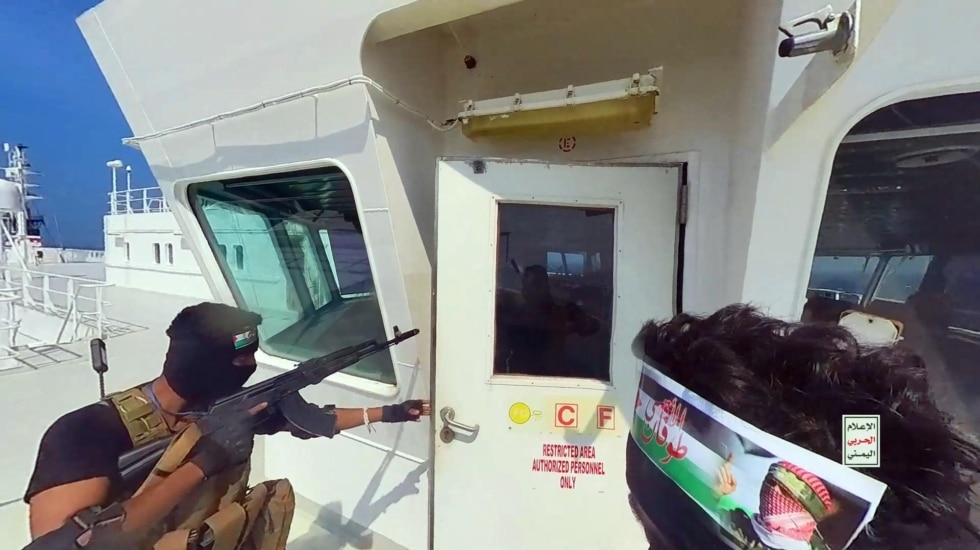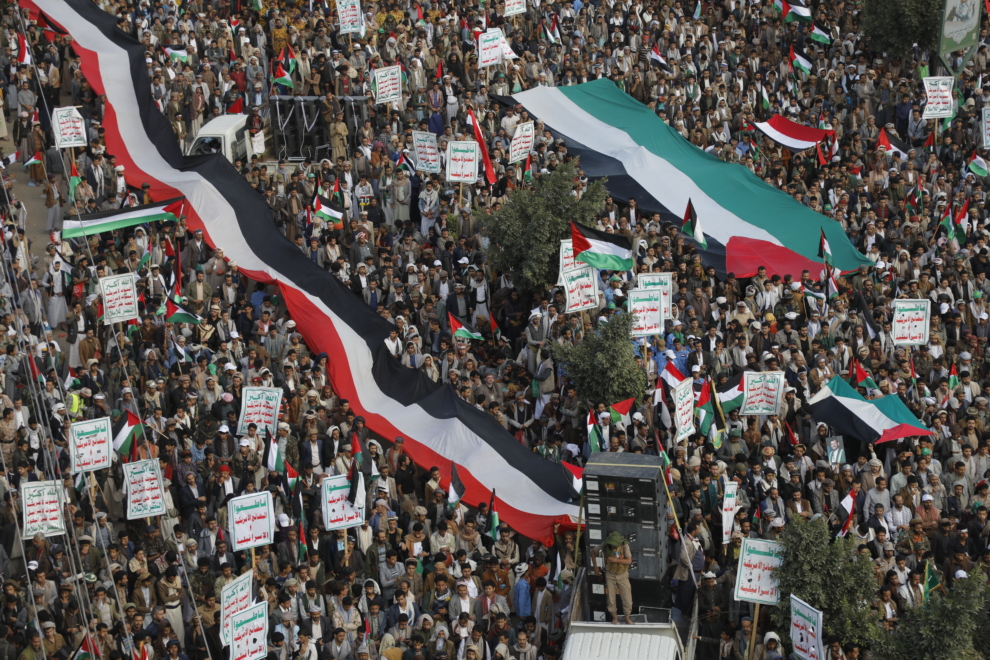

Houthi militants attack the cargo ship Galaxy Leader in the Red Sea, in video provided by Yemen’s Shiite movement.
Their positions are 1,600 kilometers from Israel, but they are the last serious threat it faces. Tel Avivin the midst of a ground operation that has already killed more than 13,000 people in the Gaza Strip. HouthisShia Islamist movement, part of a movement dubbed the “Axis of Resistance”, financed and armed IranThey are feared, hardened by failure, and capable of launching missiles at Israel or seizing ships in the Red Sea “to help the Palestinians in their victory.”
“This is a pretty serious warning. The Houthis do not make empty threats,” he notes. Independent Hisham Omeisi, a well-known Yemeni analyst. Few people know the Houthis like he does. In 2017, he was arrested by members of the group and spent six months in solitary confinement in Sanaa prison. A few months after his release, he fled the country. “For some reason people continue to underestimate the Houthis. We are talking about a strategic strait Bab el-MandabThe Houthis are well aware that their actions will directly impact international trade,” says an expert, witness and victim of their stunning rise in Yemen, the poorest country on the Arabian Peninsula.
Born in the mountains of northern Yemen.
The Houthis, or Ansar Allah (“Guerillas of Allah”, the official name of the group), are a Shia Islamist movement that has controlled large areas of Yemen since 2014. It originated in the early 1990s in school summer camps that proclaimed peace and a return to the roots of the world. Zaidismbranch of Shia Islam that venerates Zaido ben Aligreat-grandson of Imam Ali, who rebelled against the Umayyads in 740 while his capital was still in Damascus, years before his last survivor fled to Cordoba- and he paid for his insolence with martyrdom.
It’s in their DNA to resist failure. From the mountains of the north Saada The capital of the province of the same name, located at an altitude of 1800 meters, has managed to dominate Yemen. Its members preserve the traditions of the north of the country in their clothing: they wear a “tub” – a light tunic; dark jacket; brown shawl on shoulders; and the “jambiya,” a curved dagger, adjustable at the waist with a wide decorative belt. In just three decades, they have become the centerpiece of a country that is a labyrinth of courtly factions, from southern separatists to the local Muslim Brotherhood to the hosts of al-Qaeda and the Islamic State.
The Houthis owe their origins to Hussein Badreddin al-Houthi, the son of a prominent Zaidi cleric from Saada who founded and led the group until his death at the hands of government forces in September 2004, after months of insurgency. Since then, the movement has honored its founder by taking his name. They knew how to navigate a failed state. “If you ask the Houthis, they will tell you that they studied other movements to understand how to operate, and that they put them into practice in six wars with the government between 2004 and 2010. If you ask their rivals, they will tell you: “They will say that Iran’s external support was crucial,” he explains. Peter SalisburyInternational Crisis Group Yemen Specialist.
At the height of the conflict, the Houthis brought control of neighboring Saudi Arabia and its black gold.
“In reality, many different factors triggered the war, including intra-regional rivalry before the war and a marriage of convenience between the Houthis and the former president,” he adds. In 2017, the Houthis successfully staged a public test: they publicly executed Ali Abdullah SalehThe autocrat ruled the country for 33 years until his decline was caused by the Arab uprisings, with whom they allied in their attack on power.
A fragile truce reached last year has halted the civil war that has been raging since 2014. 377,000 livesAmong them, 150,000 are direct victims of violence, and the rest due to the spread of famine and diseases such as cholera and diphtheria. At the height of the conflict, the Houthis brought control of neighboring Saudi Arabia and its black gold. In 2019, drone attacks were recorded on two facilities of the state oil company. Aramcothe most profitable company on the planet, which interrupted half of the kingdom’s crude oil production and sowed panic in the stock markets of half the world.

They resisted Saudi bombing for seven years
Even an intensive bombing campaign carried out by an Arab coalition led by two regional powers, Saudi Arabia and the United Arab Emirates, could not defeat them, resulting in more than 25,000 air strikes on Yemen between 2015 and 2022, resulting in more than 24,000 people died. . . Facing oppression from their neighbors, the Houthis received funding and training from Tehran. “Iran provided missiles to the Houthis. Revolutionary Guard commanders sent to the site helped the Houthis develop missile and drone technology,” he explains to this newspaper. Nadwa al-DawsariAnalyst at the Middle East Institute with over two decades of experience working in Yemen.
Revolutionary Guard commanders help Houthis develop missile and drone technology
“The Houthis have tested these missiles in cross-border attacks on Saudi Arabia. Many of these weapons and their parts are smuggled across the Red Sea. The Houthis also inherited the Yemeni government’s arsenal of missiles and weapons when they captured the capital Sanaa and military bases when the government lost control in 2015, the expert adds. On Sunday, members of the group seized a cargo ship in the southern Red Sea belonging to Galaxy Leader, a company registered in the Isle of Man but owned by a company based in Tel Aviv. The vessel is operated by Japan.
The Israeli government called the attack “an act of Iranian terrorism” that puts international maritime security in a truly sensitive area. More than 10% of world trade passes through the Red Sea every year. Early footage of the hijacking released late Monday showed Houthi fighters approaching the ship in speedboats and attacking the cargo ship’s deck aboard a helicopter shortly before pointing their weapons at the crew.
With the motto “Death to the United States, Death to Israel, Damnation to the Jews and Victory for Islam”—their battle cry—the Houthis have established themselves as another front in the conflict between Israel and Hamas. Regional escalation along with Hezbollah escalation on the Lebanese border. Since October, the Houthis have launched ballistic missiles and drones targeting Israel. Their military spokesman, Yahya Sari, promised more attacks “to help the Palestinians in their victory.” Rocket batteries and fighter jets intercepted most of the attacks before landing on Israeli soil. However, on November 9, a Houthi Sammad-3 drone struck a school in Eilat in southern Israel. “We are arriving. Expect a surprise,” we read in the article. Some of the posters distributed by the group are in Hebrew.
“Golden Opportunity”
El-Omeisy has no doubt that the Houthis will contribute to the escalation of hostilities. “They will escalate the conflict. This is a great opportunity for the Houthis to become transnational and at the same time ride the regional wave of discontent due to the inaction of the international community,” he said. Its international relevance is also helped by the relative calm established by the ceasefire signed in 2022 and the talks Saudi Arabia is pursuing with the Houthis to exit the costly war and, in turn, recognize its legitimacy in the divided country. “between the Houthis in the north and separatists in the south.

In his public appearances, his spokesman blames Israel and “its ongoing crimes” for instability in the Middle East and promises to continue carrying out attacks “until Israeli aggression stops.” He does this with the determination of a group that has come down from the mountains, rules a country, and now threatens one of the world’s trade routes. “If the war escalates involving Iran and its proxies, the Houthis could threaten international shipping in the Red Sea, affecting everyone, not just Israel,” Al-Dawsari warns.
They have income that can be extracted. “The Houthis are applauded even by their worst enemies in Yemen for striking Israel. Given the strong dissatisfaction with Israel and compassion for the Palestinian cause, this could help the Houthis recruit fighters. They have always described their cause as a war against “the Zionist enemy and the United States,” so the conflict in Israel only confirms their claims. Any escalation will benefit the Houthis and will be to the detriment of peace in Yemen,” he concludes.
Source: El Independiente